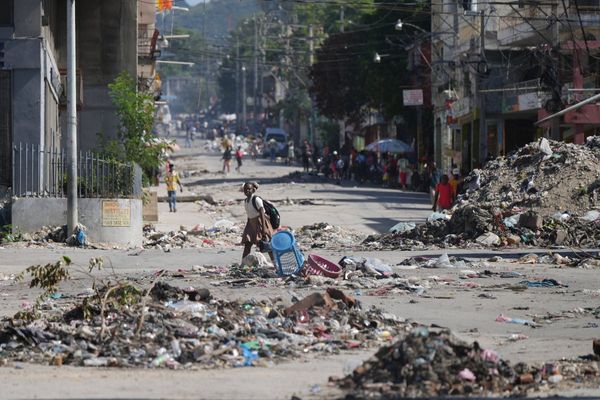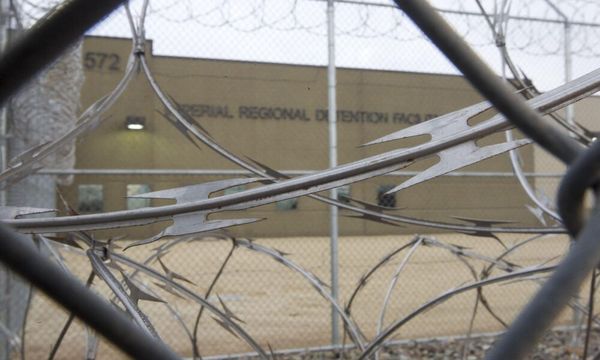
Large groups of asylum seekers arriving to New Zealand by sea could be detained in prison for up to 28 days without a warrant, under a law change that was proposed even though a refugee boat has never reached the country.
The bill – put forward by the Labour government – passed its first reading on Wednesday. It also determines that asylum seekers who arrive in groups of 30 or more by sea would have no possibility of attaining the entry permissions or temporary visas conferred on other travellers to New Zealand – including asylum seekers who enter the country by air.
The measures were decried by opponents as fear-mongering and election year cynicism in a country that has never seen a mass arrival by sea and where policy on asylum seekers has rarely struck the more conservative notes of Britain and Australia.
Michael Wood, New Zealand’s immigration minister, presented the change as a set of technical measures and said they were intended to plug gaps in existing law about mass arrivals of refugees to ensure “an orderly and rights-compliant framework” if boats of asylum seekers ever reached the country. That included the possibility that mass arrivals could be detained for up to 28 days – up from four days currently – to ensure they received adequate legal representation.
“This is a low risk event,” Wood told parliament on Wednesday. “It has been rightly noted that we have not had a mass arrival maritime event in New Zealand previously and it remains a low risk event due to our geographical isolation but it is not a no risk event.”
Speaking to reporters on Tuesday, he rejected the idea that the policy was intended to align New Zealand with Australia’s harsher response to mass arrivals by boat.
“We do have international obligations to prevent and combat people smuggling and to protect the rights of smuggled migrants,” Wood told parliament.
Golriz Ghahraman, a Green party lawmaker who was an asylum seeker to New Zealand as a child, said the proposal marked a “sad day” for the country.
“It is the first time that a political party, certainly a government, has made the humanity and the rights of asylum seekers an election year issue,” Ghahraman said. It did not seem to be, she added, one of the “bread and butter issues” to which Labour under its new leader, prime minister Chris Hipkins, had pledged to focus its efforts.
Wednesday’s debate at times struck unusual notes; lawmakers suggested detailed harms that they said might be presented by mass arrivals by boat despite acknowledging that this was not likely in New Zealand and had never happened before. Labour MPs insisted the changes were merely procedural ones prompted by public servants’ advice and were for the benefit of asylum seekers.
Meanwhile, centre-right National, the main opposition party, said they would support the bill but questioned whether it still represented too appealing a regime for people smugglers (they also noted that the chances of a refugee boat reaching New Zealand was unlikely). Lawmakers rebuked Labour for opposing earlier laws for managing mass arrivals advanced by a National government in 2013.
Michael Woodhouse, a National lawmaker, recalled a Labour MP saying there was “more chance of little green men coming from Mars than a boat landing on the shores of New Zealand” in a previous parliamentary debate.
The bill will now be considered by a select committee before it faces a second vote.
Some advocates said the government should supply the immigration system with sufficient resources to preserve asylum seekers’ legal rights, rather than extending the period for which they could be imprisoned.
Others did not relish the prospect of an election-year debate tinged with wariness of refugees. MPs on Wednesday had employed “shocking” language about hypothetical arrivals said Aliya Danzeisen, the national coordinator of the Islamic Women’s Council of New Zealand.
During the debate, one MP referred to “queue jumpers” and another to a potential “boat load of al-Qaida” – remarks which were “quite xenophobic, Islamophobic, and simply untrue,” Danzeisen said.
Michael Wood said during his speech introducing the bill that it was “not the kind of piece of legislation that as a Labour minister, I’ve dreamed of bringing to this house”, prompting some analysts to question why he had done so.
“This raids into National party territory where the centre-right occupy and that’s where Labour thinks they can make their gains,” said David Cormack, the co-founder of a Wellington public relations and lobbying firm.
Cormack, a former Greens staffer, added: “It is ethically and morally callous and awful.”







